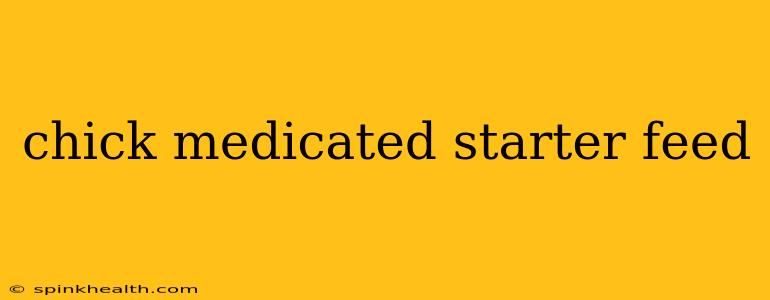Raising chicks is a rewarding experience, but it comes with responsibilities. One crucial aspect is ensuring your chicks receive proper nutrition and disease prevention, which is where medicated chick starter feed comes in. This isn't just about feeding them; it's about safeguarding their health and setting them up for a thriving life. Let's delve into the world of medicated chick starter feed, exploring its benefits, drawbacks, and everything you need to know to make informed choices for your feathered friends.
What is Medicated Chick Starter Feed?
Imagine a tiny chick, barely bigger than your thumb, needing all the nutrients and protection it can get. Medicated chick starter feed is specially formulated to provide this. It's a complete feed containing essential nutrients for growth, like protein, vitamins, and minerals, plus added medications to prevent or treat common chick diseases. These medications are typically antibiotics, coccidiostats (to combat coccidiosis), or a combination of both, carefully measured to be safe and effective for young birds.
The story behind medicated feed is one of protecting vulnerable chicks. Early poultry farmers faced devastating losses from diseases like coccidiosis, a parasitic infection causing severe diarrhea and even death. The introduction of medicated feed dramatically changed the game, allowing for higher survival rates and healthier flocks.
What are the Benefits of Using Medicated Chick Starter Feed?
The benefits are clear and impactful:
-
Disease Prevention: This is the primary advantage. Medicated feed helps prevent common chick diseases, reducing mortality and the need for individual treatments. Think of it as a preventative measure, like a vaccine, but delivered through their food.
-
Improved Growth Rates: Healthier chicks grow faster and more efficiently, translating to a quicker return on your investment. By eliminating the setback of disease, their energy is channeled into growth.
-
Reduced Veterinary Costs: Preventing illness reduces the need for veterinary intervention, saving you money and stress.
-
Increased Flock Uniformity: Medicated feed helps ensure all chicks are healthy and growing at a similar rate, leading to a more uniform flock.
What are the Drawbacks of Using Medicated Chick Starter Feed?
While medicated feed offers significant benefits, it's important to be aware of the potential drawbacks:
-
Antibiotic Resistance: The overuse of antibiotics can contribute to antibiotic resistance in bacteria. This is a growing concern in both human and animal health.
-
Potential for Residue: While regulated, there's always a tiny risk of medication residue in eggs or meat if the feed isn't used correctly.
-
Cost: Medicated feed is generally more expensive than non-medicated feed.
What are the Alternatives to Medicated Chick Starter Feed?
Several alternatives exist, but they require a more hands-on approach:
-
Non-Medicated Starter Feed with Supplements: You can use a standard non-medicated starter feed and supplement with coccidiostats or other medications as needed, under veterinary guidance.
-
Natural Methods: Some farmers utilize natural methods like probiotics or herbal remedies to boost chick immunity. These require thorough research and potentially close monitoring.
-
Strict Hygiene: Maintaining impeccable hygiene in the coop and brooder can significantly reduce disease risk, lessening the reliance on medicated feed.
How to Choose the Right Medicated Chick Starter Feed?
Choosing the right feed involves careful consideration:
-
Chick Breed: Different breeds may have varying nutritional needs.
-
Age: Starter feed is formulated for chicks up to a certain age, after which you'll need to transition to grower feed.
-
Medication Type: Understand the specific medications included and their purpose.
-
Reputable Brand: Opt for well-established brands that maintain quality control and regulatory compliance.
Is medicated chick starter feed safe for humans?
Yes, medicated chick starter feed is generally safe for humans when used and handled as directed. However, it's crucial to follow instructions carefully to avoid accidental ingestion or contamination. Always wash your hands thoroughly after handling feed or chicks. The presence of medication in the feed is at levels deemed safe by regulatory bodies for the birds, but accidental consumption by humans should be avoided.
How long should chicks be on medicated starter feed?
The duration your chicks need to be on medicated starter feed depends on several factors including the specific feed formulation, the age of the chicks and the disease prevalence in your area. Always follow the instructions on the feed bag and consult with your veterinarian or a poultry specialist for tailored advice. Generally, you might transition your chicks to a non-medicated grower feed at around 4-6 weeks of age.
Is medicated chick starter feed necessary?
Whether or not medicated chick starter feed is necessary depends on your circumstances. If you're in an area with a high prevalence of coccidiosis or other chick diseases, or if you're raising a large number of chicks, it offers significant advantages in preventing disease outbreaks and ensuring flock health. In lower-risk situations, or with smaller flocks, you might consider alternatives like robust hygiene practices and non-medicated feed with supplementation if needed. The decision should be made in consultation with your veterinarian or experienced poultry farmer.
Raising healthy chicks is a journey. Medicated chick starter feed is a tool that can significantly improve your success, but informed decision-making based on your specific situation is key. Remember to always prioritize the health and well-being of your flock.

